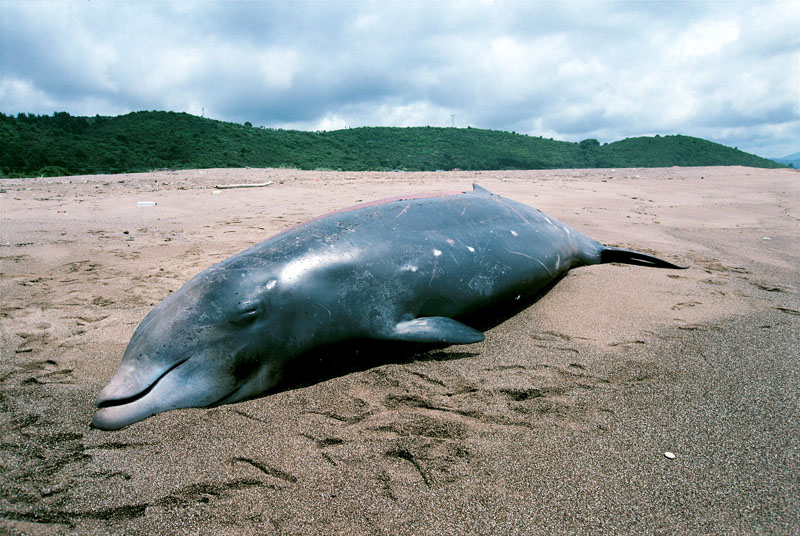Update on Greece: Oil exploration linked to stranding of protected whales off Corfu
Update on whale strandings in Corfu: On the 20th and 21st of February, three live Cuvier’s beaked whales stranded on Corfu. This highly atypical stranding coincided with seismic hydrocarbon exploration in «Block 3» on behalf of the oil company Hellenic Petroleum. Corfu is situated close to the Hellenic Trench, an underwater canyon which is a critical habitat for deep-diving cetacean species, such as sperm whales and Cuvier’s beaked whales.
There is ample evidence that these marine mammals are particularly vulnerable to loud underwater noise, including that produced by seismic oil and gas exploration. Despite this fact and despite clear requirements prior to the approval of noise generating activities under EU and international obligations, a thorough Environmental Impact Assessment before approving this recent seismic exploration activities was lacking.
Further, EU legislation obliges Member States to achieve Good Environmental Status (GES) among other aspects by reducing underwater noise pollution and to protect marine species from disturbance. Several multilateral environmental agreements ratified by Greece explicitly urge Parties to control the impact of noise within the habitats of vulnerable marine species.
The most recent IPCC Report made it very clear that urgent and decisive action is needed to reduce greenhouse gas emissions. The continued exploration for new oil and gas deposits runs counter to the 2015 Paris Agreement and ignores the warning of the IPCC.
OceanCare together with 60 Greek and international NGOs, scientific experts, and representatives of the local community of the Ionian Islands therefore called on the Greek Government in a joint open letter to reconsider Greece’s oil and gas licensing activities, especially in the Hellenic Trench.
Greek Government urged to stop oil exploration activities
Wednesday, 23rd of February, OceanCare renewed its call to the Greek government, in letter addressed to the Greek Prime Minister Kyriakos Mitsotakis, to immediately halt any oil and gas exploration activities in Greek waters. The call was done after an atypical whale stranding occurred on the beaches off Corfu which coincided in time and space with so called seismic exploration activities searching for hydrocarbon resources. After two beaked whales stranded alive on Sunday, 20th February, a third whale beached thew following day Monday morning. Greek NGOs, including WWF Greece, iSeas, Greenpeace, Pelagos Cetacean Research Institute and many others jointly voiced their concerns and critique to the Greek government and receive international support. The details about the concerns raised by OceanCare can be found in the letter.
Whale strandings in Corfu
Coinciding with seismic activities off Corfu, Greece, on February 20, 2022 two Cuvier’s beaked whales stranded on beaches of the popular holiday island this morning – on International Whale Day – in a distance of 30 kilometres. One animal was rescued and refloated back into the sea, the second whale is currently still stranded. It is unclear whether the two animals have a chance of survival.
OceanCare, numerous scientists and other marine conservation organisations had urged the Greek authorities not to issue a permit for seismic activities in the Hellenic Trench. The area is identified as Important Marine Mammal Area (IMMA) and is home for endangered species, such as deep-diving Cuvier beaked whales and sperm whales. The wider activities have also taken place close to a strictly protected Natura 2000 site. However, the Greek authorities have ignored the marine conservationists’ appeals and even suspended the implementation of a mandatory environmental impact assessment, although this is required under both EU law and according to Greece’s international commitments, which includes the need to apply the CMS Family Guidelines on Environmental Impact Assessments prior to noise generating activities and the ACCOBAMS Noise Guidelines.
The research vessel «SW Cook» has been active in Greek waters since the beginning of February and most recent evidence suggests that the «SW Cook» has proceeded to the Ionian Block offshore Greece to conduct further seismic exploration.[1] During seismic activities, air guns are deployed, which produce impulsive noise up to 260 decibels when surveying the seabed. The immense noise covers an area of thousands of square kilometres. This intense underwater noise is life-threatening for numerous marine species, from the smallest crustaceans to the largest whales. Atypical whale strandings, such as the one off Corfu, appear in time area context to intense underwater noise generating activities.
«The whale stranding is probably only the tip of the iceberg; many more animals and not only whales may have been harmed. Animals exposed to this intense sound may get killed and sink to the bottom of the sea, while it just a few may be washed ashore dead or alive» says Nicolas Entrup, Director of International Relations at OceanCare.
«We are calling on Greece as well as other governments to halt all seismic activities and therefore to oil exploration. Continuing oil exploration is incompatible with the goals of the Paris Agreement. They ignore the climate crisis we face and threatens whales and other marine life in the Mediterranean» says OceanCare spokesperson Nicolas Entrup.
[1] This is further corroborated by tracing the vessels activities through Marine Traffic, available at: www.marinetraffic.com/en/ais/home/centerx:20.3/centery:39.6/zoom:7

